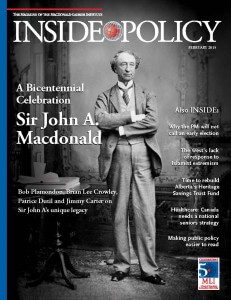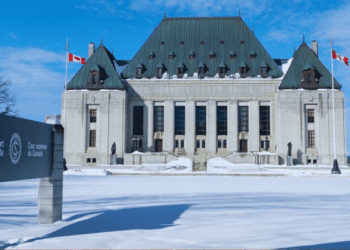In the Feb. 2015 edition of Inside Policy, the magazine of the Macdonald-Laurier Institute, Stanley Hartt explains why there is little reason for Prime Minister Stephen Harper to call an early election in 2015.
“Having made the commitment to fixed election dates, not having a precarious minority government situation to deal with, and absent a cabal of the defeated to seize the very power the Canadian people had just denied them, the PM should stick to the pre-determined election date and use the intervening time, as is appropriate in any democracy, to convince the electorate that his government deserves to be re-elected”, writes Hartt.
By Stanley Hartt, Feb. 9, 2015
In football, the “trap play” is a simple manoeuvre where one of the offensive guards vacates his position, making it look to his defensive opponent as if he has a clear path to sack the quarterback. When the defender takes the bait and runs through the open space, he is met with a crushing and unexpected block from the other offensive guard, opening a huge hole available to the ball carrier.
This is a metaphor for what Opposition strategists think they are doing when they commission or encourage op-ed or analysis pieces from partisan or sympathetic commentators insisting that Stephen Harper will be forced to call an early election to avoid having to face the fall-out of the Mike Duffy trial.
The Conservative government is very unlikely to fall for this sort of planted inducement and make a serious tactical blunder.
There are a number of reasons why this is so. The most elementary of these is that, having established a regime of fixed election dates (the next one we already know is supposed to be October 19, 2015), the Prime Minister is unlikely to expose himself to the double whammy of, first, being accused of going back on his announced commitment and, (worse) second, allowing all of the prattling pundits to assert that this was done because of his terror of the revelations to come in the Duffy trial, which, at a time when not one piece of evidence will yet have been adduced, they will proceed to “review” ad nauseum in condemnatory fashion.
Now, there are those who believe that the Prime Minister and his party were wrong to weaken the prerogative which our system places in his hands to advise the Governor General to dissolve Parliament and trigger an election at any time. This power can be used to keep frisky caucus members in line when they are free-lancing but are still unsure of their electoral chances in an imminent vote by their constituents. It was also very helpful during the “coalition” crisis, when three political formations which had recently been defeated at the polls did some quick addition and calculated that together they could offer the Queen’s representative an alternative to a general election by combining forces to take the reins of government from the party that had actually won the most seats, namely the Conservatives.
Of course, all executive prerogatives must be used with caution: there was some significant amount of outrage at the PM’s use of prorogation and the ultimate calling of another election which produced the current majority government. (It was a bit strange that this indignation was not repeated when Dalton McGuinty used the very same tactic in Ontario. McGuinty, it should be remembered, did it to avoid the certainty of a vote of censure in the Legislature over the cost of the gas plant cancellations, whereas the upset of the “gang of three” coalition partners was triggered by nothing more than self-interest as a protest against the imminent demise of the public subsidy their parties had been receiving from the federal treasury based on the number of votes cast for them in the most recent election).
Indeed, all of the mechanisms which we have inherited from the constitutional practices of the United Kingdom (and built upon, it can be argued, very successfully) which militate for stable, majority government come under attack from observers who don’t have to face election to keep their jobs. So, for example, the “first past the post” vote-counting system means that a majority government can be elected with 40% or even less of the popular vote, but there are constantly those who urge us to weaken this important and intended feature by adopting some form of proportional representation or preferential ballot.
Similarly, there is a steady objection to the control of the operations of government by the “centre”, which is seen as the dictatorial usurpation of the freedom and independence of MPs to act according to conscience and the instructions of their electors, when in fact it is nothing more than an organized plan to ensure that the government plays “error-free baseball” and maintains the discipline which ensures that it retains the confidence of the House of Commons, failing which the government falls and we have what, amazingly, we invariably describe as an “unnecessary” election!
So, while the idea of committing to an American-style fixed election date meant appearing to abandon a tool we had collectively intentionally placed in the hands of our head of government, given the opprobrium that invariably attends the actual use of such a prerogative, perhaps the PM has surrendered little of material value at all. But the most important reason not to be lured into the strategic abyss which the Sirens of Opposition mirages would like to tempt the PM to fall into could be the fact that there is nothing at all to fear in the upcoming Duffy trial.
Suspended Senator Duffy has been charged with 31 counts of criminal activity in all: one count of fraud and one count of breach of trust connected to his expense claims in relation to his residency; nine counts of fraud and nine counts of breach of trust in relation to expense claims unrelated to Senate business; four counts of fraud and four counts of breach of trust in connection with the awarding of consulting contracts and one count each of bribery of a judicial officer, fraud on the Government and breach of trust by directly or indirectly corruptly accepting, obtaining, agreeing to accept, or attempting to obtain, money for himself, namely the famous $90,000 from Nigel Wright.
Now, it is very important to remember that Nigel Wright himself has not been charged with the mirror indictable offense under Section 119 (1) (b) of directly or indirectly, corruptly giving or offering to the holder of a judicial office, a member of Parliament or of the legislature of a province, or to anyone for the benefit of that person, any money, valuable consideration, office, place or employment in respect of anything done or omitted or to be done or omitted by that person in their official capacity.
Much puzzlement has been expressed at how it is possible for the giver in a transaction to be innocent of wrongdoing when the recipient in the very same transaction has the legal book thrown at him. The answer lies in the word “corruptly” which appears in both subsection (a), the section that relates to receiving, and subsection (b), the subsection that relates to giving. While no one knows the details of why the RCMP chose to declare that no charges would be laid against the Prime Minister’s former chief of staff, logic would say that the evidence showed that Nigel’s intentions were not corrupt. Anyone who knows Nigel would understand how straightforward such a conclusion would be to arrive at.
That means that Duffy is alleged to have had corrupt motives or intentions in seeking and accepting the payment so that he could repay his improperly submitted expense claims. And thereby hangs the basis for the proposition that the Prime Minister has nothing to fear from the trial and may not even be a compellable witness.
On September 16, 2014, the National Post ran a story, on the occasion of a court appearance by Duffy’s lawyer to discuss procedural arrangements surrounding the forthcoming trial, in which Donald Bayne is reported to have said, “This isn’t a political case. This is a criminal case. It’s going to be conducted professionally” and, “please understand, this isn’t being run as a personal or political vendetta.”
“The very strong judiciary in the Ontario Court of Justice”, he continued, “will not allow this case to be turned into a political circus and we certainly don’t intend to conduct the matter that way.”
While Bayne added that he wouldn’t rule out the possibility that Prime Minister Stephen Harper will be called to testify, a real question arises about what the Prime Minister could usefully be asked about Duffy’s state of mind. An attempt to stoke pent-up curiosity or to probe the question that has pre-occupied the media, namely what the Prime Minister knew about Wright’s payment of $90,000 to Duffy, might make for journalistic buzz, but it would not appear to satisfy the test of relevance, which is what the court cares about.
A person can be subpoenaed to give evidence in a Canadian criminal proceeding if the party issuing the subpoena can establish that the witness would likely or probably have material evidence to give. It is not enough that the witness “may have” material evidence. Neither a “reasonable hope” nor “a possibility” is enough to justify compelling a person to testify.
So, unless the “political circus” remark was facetious, or feeding reporters’ curiosity is considered a proper function for our criminal justice system, it would seem that the evidentiary foundation for a subpoena being issued to the Prime Minister in the Duffy case would face serious hurdles and would be subject to being quashed.
This does not even raise the issue of parliamentary privilege. In the Commons, the Prime Minister was asked, “Will the prime minister attempt to hide behind parliamentary privilege to avoid testifying?” by NDP Leader Tom Mulcair. The PM’s response was, “Obviously if you read the investigator’s report, there’s absolutely no reason to suggest I would do that”. Indeed, doing that would permit the speculation and spinning of invented facts to run amuck and undo any good the avoidance of actually testifying might have achieved.
Having made the commitment to fixed election dates, not having a precarious minority government situation to deal with, and absent a cabal of the defeated to seize the very power the Canadian people had just denied them, the PM should stick to the pre-determined election date and use the intervening time, as is appropriate in any democracy, to convince the electorate that his government deserves to be re-elected.
Stanley Herbert Hartt, OC, QC is a lawyer, lecturer, businessman, and civil servant. He currently serves as counsel at Norton Rose Fulbright Canada. Previously Mr. Hartt was chairman of Macquarie Capital Markets Canada Ltd. Before this he practised law as a partner for 20 years at a leading Canadian business law firm and was chairman of Citigroup Global Markets Canada and its predecessor Salomon Smith Barney Canada. Mr. Hartt also served as chairman, president and CEO of Campeau Corporation, deputy minister at the Department of Finance and, in the late 1980s, as chief of staff in the Office of the Prime Minister.




